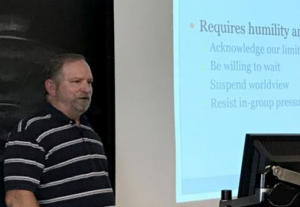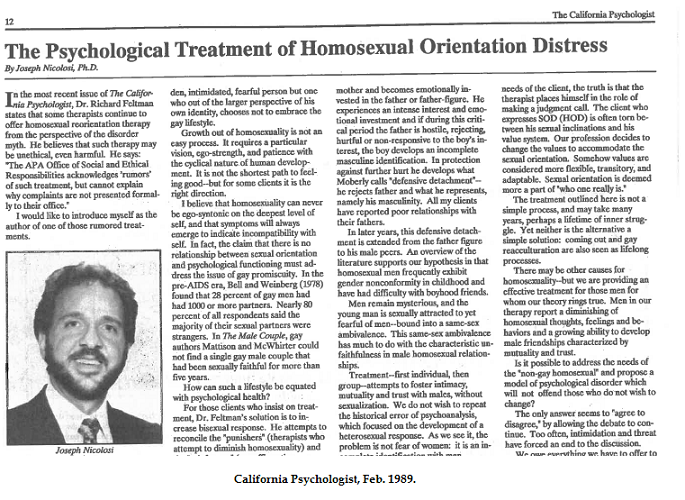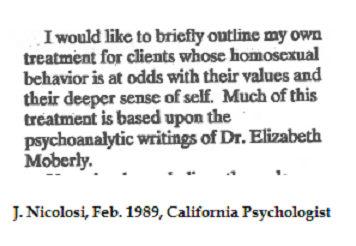Over the past few weeks, I have written about the Nashville Statement. In doing so, I realized that many readers here haven’t followed this blog
since the beginning (2005) and aren’t aware of my work in the area of sexual identity. In fact, I would say a significant number of readers came along in 2014 when I wrote about Mars Hill Church.
On Saturday, Yahoo News published a profile of my work by Senior Political Correspondent Jon Ward. In the well written piece, Jon focused on my prior support for sexual orientation change efforts. However, he also connected the dots from that work to my opposition to Uganda’s Anti-Homosexuality Bill and later opposition to Christian nationalism and megachurch exploitation. I appreciate Jon’s careful attention to the nuances in the story.
If you are interested in more information about how I went from being a supporter of reorientation therapy to being a vocal opponent and how that journey connects to current interests, I encourage you to go read Jon’s profile.
Tag: reparative therapy
Reparative Therapy Pioneer Joseph Nicolosi, Dead at 70

I was saddened just now to read in the Daily Beast that Joe Nicolosi died suddenly early this morning. The Beast cited the Facebook page of Nicolosi’s clinic, the Thomas Aquinas Psychological Clinic in Encino, CA for the news. According to the note, posted earlier this afternoon:
We are deeply saddened and shocked to announce the death of Dr. Joseph Nicolosi yesterday in California from complications from the flu.
My condolences to his wife Linda and son Joseph, Jr.
The illness must have come upon him quickly; I know someone who spoke to him just recently. As always, he was vigorously defending his ideas.
We disagreed about a great many things, but I can say to his credit that he cared deeply about his family, his work, and his clients.
Nicolosi was the co-founder with Charles Socarides and Ben Kaufman of the National Association for the Research and Therapy of Homosexuality (NARTH) in 1992. Along with Focus on the Family and Exodus International, NARTH was a third of the ex-gay movement’s trinity. Nicolosi spoke frequently at Exodus conferences and was for many years the featured speaker at Focus on the Family’s Love Won Out traveling ex-gay conference.
Nicolosi adapted psychoanalytic ideas from Elizabeth Moberly and others to promote what he considered to be a therapeutic approach to sexual orientation change. He was most interested in the formation of male homosexuality and believed distant fathers and overbearing mothers together created a family triad which greatly increased the chances that a male child would become gay. Even as neurological and family studies called his work into question, Nicolosi defended his ideas via media appearances and his organization NARTH. At his death, Nicolosi was in the middle of a research project with psychologist Carolyn Pela.
In response to reports of harm from Nicolosi’s theories and practice, many gay rights advocates made ending reparative therapy a prime objective. Currently, five states, DC and several cities have banned reparative therapy for minors.
This evening Nicolosi’s wife Linda released a statement on the clinic Facebook page.
Calling All Former Participants in Studies of Sexual Orientation Change Efforts
Writing on Tuesday about Joseph Nicolosi’s new reparative therapy study got me thinking about the other studies of sexual orientation change efforts which have come and gone. I know a few participants in the Spitzer, Shidlo and Schroeder, Jones and Yarhouse studies who once told researchers they had changed orientation but now identify as gay. I suspect some have stayed about the same as they were when they participated in the research. It would be interesting to find out if there are any patterns in experience since those studies were published.
With that in mind, I am calling for subjects in any of the studies designed to assess sexual reorientation to contact me. If you participated in the Spitzer, Shidlo and Schroeder, Jones and Yarhouse, or any study which asked if you had changed orientation (including my 2005 study), please contact me at this email ([email protected]). Those interested don’t have to reveal their identities at first and feel free to write with any questions about this effort.
It seems pretty clear to me that some erosion in the percentage of people claiming change has occurred since Exodus International shut down. Several former leaders in Exodus have recently come out as gay and there may be others who participated in studies from that era who have gone in a different direction. While this isn’t exact science, it may help to shed some light on the long term experience of those who once claimed to have changed orientation.
New Sexual Reorientation Study Off to a Shaky Start; Michael Bailey's Brain Scan Offer is Still Good
After the closing of Exodus International, the wind went out of the sexual reorientation sails. In June of last year, former ex-gay organization Exodus International leader Alan Chambers said the movement was “gasping for air.”
However, a quiet breeze may be blowing still as demonstrated by a study being conducted by one of the luminaries of reparative therapy, Joseph Nicolosi and relative newcomer Carolyn Pela. Nicolosi and Pela summarized their preliminary findings at a meeting of the Christian Association for Psychological Studies a year ago. Nicolosi described the study on his website:
Dr. Pela described the study as being longitudinal with a within-group repeated-measures design. Their dependent variable was psychotherapy as conducted at Dr. Nicolosi’s Thomas Aquinas Psychological Clinic. The independent variables were (1) well-being as operationalized by the Outcome Questionnaire 45 (OQ-45.2), a highly respected measure of psychotherapy process and outcome, and (2) separately assessed dimensions of sexual orientation, namely, thoughts, desires, behavior, and identity. Data collected to date involved 102 male psychotherapy clients who presented with ambivalence, discomfort, or distress regarding their SSA. Eighty-one participants had been involved in the study long enough to have well-being assessed and data on change were available from 56 participants at the time of the CAPS presentation.
I am pretty sure the dependent and independent variables are reversed in his description. The independent variable is what is manipulated in an experiment and the dependent variable is a measure of results (see this brief explanation). That problem aside, what did they find?
Findings from preliminary data collected over a 12 month period indicated statistically significant reductions in distress and improvements in well-being, significant movement toward heterosexual identity, and significant increases in heterosexual thoughts and desires with accompanying significant decreases in homosexual thoughts and desires. Effect sizes for these changes were generally in the moderate range, which suggests they are robust and not likely to be statistical artifacts. The findings did not discover significant change in heterosexual or homosexual kissing or sexual activity. These findings appear to have been the result of very low base rates in these behaviors among study participants leading to floor effects and a subsequent lack of change, as it is not possible to change a behavior in which participants are not engaging.
To summarize, the participants were thinking straighter but not doing anything about it.
To me, this result is understandable. If one is in treatment with the stated goal to think more about heterosexual outcomes, then there would be strong motivation to produce those experiences when asked. However, the test for any actual change will be when therapy is over and the regular rehearsal of such ideas isn’t happening. The difference between process changes (how a client feels during therapy) and outcome changes (what remains after therapy is over) is often great. Reorientation therapy studies are filled with people who said they had changed during the study but then felt differently months or years later. Thus, follow up must be a key component of any therapy study.
It should be pointed out that this study isn’t a true experiment since there is no control group. There isn’t a way to test for the effect of the passing of time. Spontaneous fluidity has been reported and it isn’t clear without a control group that psychotherapy is responsible for any change that is reported (or to what degree the therapy is responsible). Without a long term follow up and a control group, this study won’t provide much more information than we already have.
Finally, if Nicoloso and Pela truly want a potent and believable pre and post measurement, they should take Northwestern University professor Michael Bailey’s offer to conduct brain scans of the participants. Some years ago, Bailey informed Nicolosi that he could bring his patients to the lab to test their automatic responses to erotic cues. Nicolosi never took him up on the offer. I recently asked Bailey if the offer was still good. He answered in the affirmative. Pre (or even mid) treatment scans compared with post-treatment scans would help to offset the lack of a control group.
Who Founded Reparative Therapy? Part Two
Yesterday, I described a conflict within the ex-gay movement about who founded reparative therapy. The dispute took place between 1989 and 1996 and involved Elizabeth Moberly, Joseph Nicolosi and the board of now closed Exodus International.
In the post yesterday, I published two letters to the editor, one from Moberly accusing Nicolosi of inadequately citing her work in a February 1989 California Psychologist article on reparative therapy. The other letter came from Nicolosi and claimed his work was different from Moberly’s.
Thanks to the help of California Psychological Association administrator Patricia VanWoerkom, I am able to publish the Nicolosi article. An image of part of it is below. To read the entire article, click here.

In the article, Nicolosi says:

He gives credit to Moberly for her writings but this was not enough for her. In her pleas to the Exodus International board, Moberly claims that Nicolosi was merely a practitioner of her reparative therapy approach. She felt Nicolosi’s article wasn’t just based on her theoretical writings but that his entire approach was simply borrowed from her. From her point of view, he was not a developer or collaborator but someone who simply copied what she had already discovered.
Moberly pointed out to the Exodus board that Nicolosi said he was the “author of one of those rumored treatments [to help gays change to straight].” Moberly countered that Nicolosi did not author anything. He simply copied what she had written and passed some of it off as his own work.
According to Moberly, she filed an ethics complaint with the APA and CPA. Only the CPA responded, she claimed, and found that Nicolosi had inadvertently copied her material. I have reached out again to the CPA and in a future post hope to be to confirm or deny Moberly’s claim.